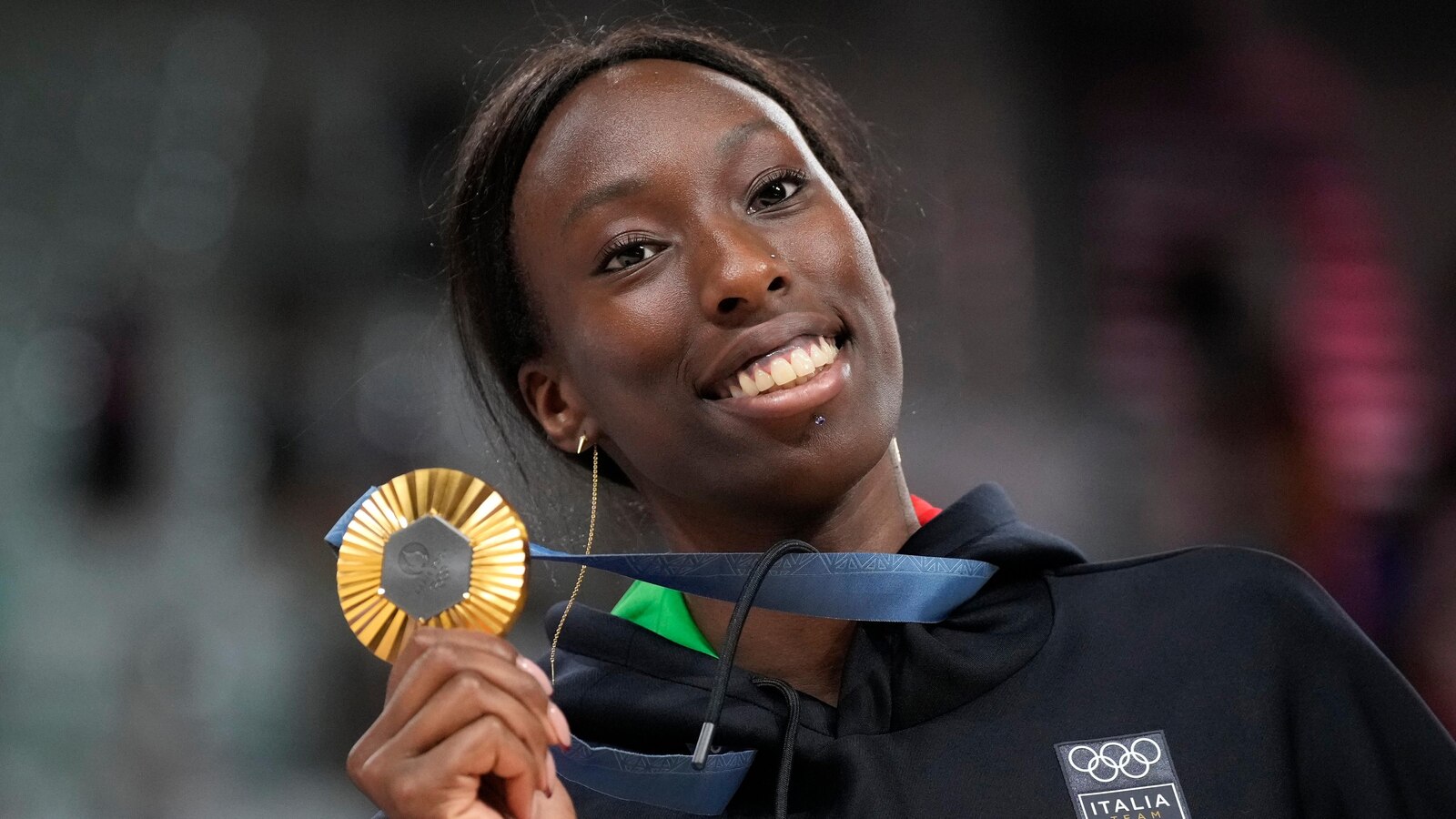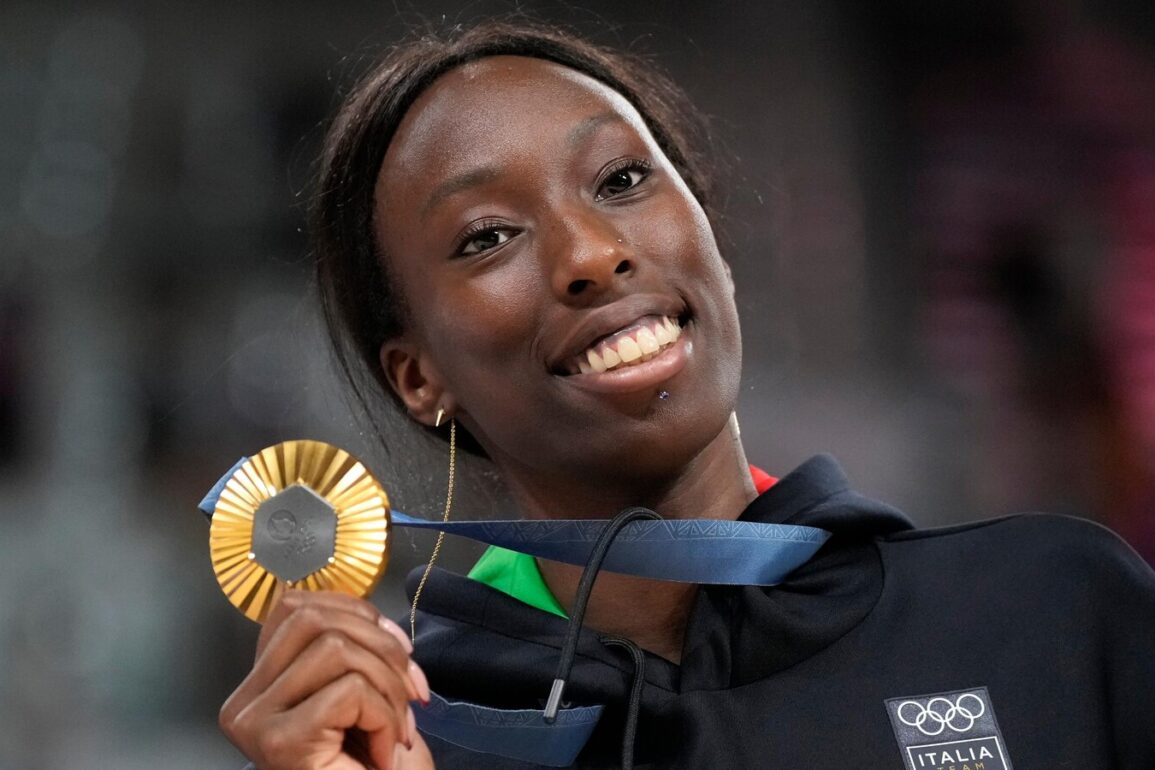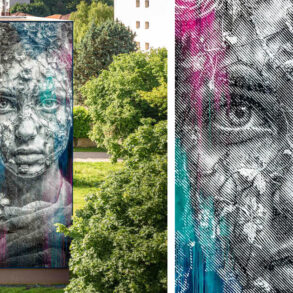
ROME — Rome’s mayor and a chorus of others have denounced the defacing of a street-art celebration of Paola Egonu, who helped lead Italy to its first-ever Olympic gold medal in women’s volleyball in Paris and who has faced years of racist abuse at home.
Egonu, who was born in Italy to parents of Nigerian origin, was named tournament MVP after she led Italy to beat the U.S. defending champions on Sunday on the final day of the Games. The gold medal capped a dominant Olympic tournament in which the Italian women lost just one set.
Hours after the Games ended, street artist Laika celebrated Egonu with a work of graffiti opposite the Rome headquarters of the Italian Olympic Committee. Entitled “Italianness,” the graffiti showed Egonu, with her trademark long ponytail and wearing her Azzurri blue uniform, spiking a ball that had the words “Stop racism, hatred, xenophobia,” on it.
It was a reference to the years of racist abuse Egonu has endured as a Black athlete in Italy, with prominent figures regularly questioning her citizenship and “Italianness.” Egonu is Italian and was even awarded one of the country’s highest civilian honors in 2021 by the Italian president.
A day after images of Laika’s graffiti celebration began circulating, someone painted over the original work, turning Egonu’s dark skin pink and blurring out the words on the volleyball.
Rome Mayor Roberto Gualtieri denounced the vandalism as a “vile, shameful insult” to both Egonu and Laika.
In a statement that praised Egonu’s athletic greatness and Laika’s commitment to fighting xenophobia, Gualtieri said it was “sad that in 2024 there are still racists who are prisoners of their own ignorance who want to roll back the hands of history.”
At some point on Tuesday, someone used a dark marker to try to restore Laika’s original design.
In 2022, Egonu threatened to quit the national team after being subject to racist abuse online questioning whether she was Italian, evidence of common assumptions here that anyone who is Black is a newly arrived migrant.
In a social media post explaining the graffiti, Laika wrote that there’s no place in Italy for xenophobia, racism, hatred or intolerance. “Racism is a social plague that must be overcome. Doing so via sport is so important,” Laika wrote.
The winning Italian volleyball team featured other Black Italians, as well as Ekaterina Antropova, a Russian who has long played in Italy and was granted Italian citizenship by the government last year.
The vandalism was front-page news in Italy on Wednesday, with major dailies featuring the before and after images of Laika’s work and commentary lamenting how anyone could question Egonu’s “Italianness” after she brought such unprecedented glory to Italy.
Targeted for particular ire was the new European Parliamentarian for the xenophobic League party, Roberto Vannacci, who wrote in his 2023 racist manifesto that Egonu’s “somatic traits” weren’t like most Italians — a comment he repeated after Italy’s Olympic victory while nevertheless congratulating Egonu and the team.
“Pink skin lives only in the infantile fantasies of those who were born in another world and stayed there as misfits,” wrote Giulia Zonca in Wednesday’s La Stampa daily.
On Wednesday at the site of the defaced graffiti, passers-by were well aware of the vandalism, and cheered that someone had tried to restore Egonu’s likeness to Laika’s original.
“Honestly I don’t see why anyone would ruin a nice homage to an athlete who brought honor to Italy,” said Irene Cagli. “We are all Italian, each of us is different, each is the same, and it’s beautiful this way.”
The issue also re-ignited the long-standing debate in Italy over citizenship, given that Egonu – like any child born and raised in Italy to non-Italian parents – had no automatic right to Italian citizenship at birth. She obtained it later, after her parents became Italian.
“We believe that those who are born or are raised in Italy is Italian, anf we’ll continue to fight to change the law on citizenship,” said the head of the Democratic Party, Elly Schlein.
——-
AP visual journalists Leila El Zabri and Silvia Stellacci contributed to this report.
This post was originally published on this site be sure to check out more of their content.









